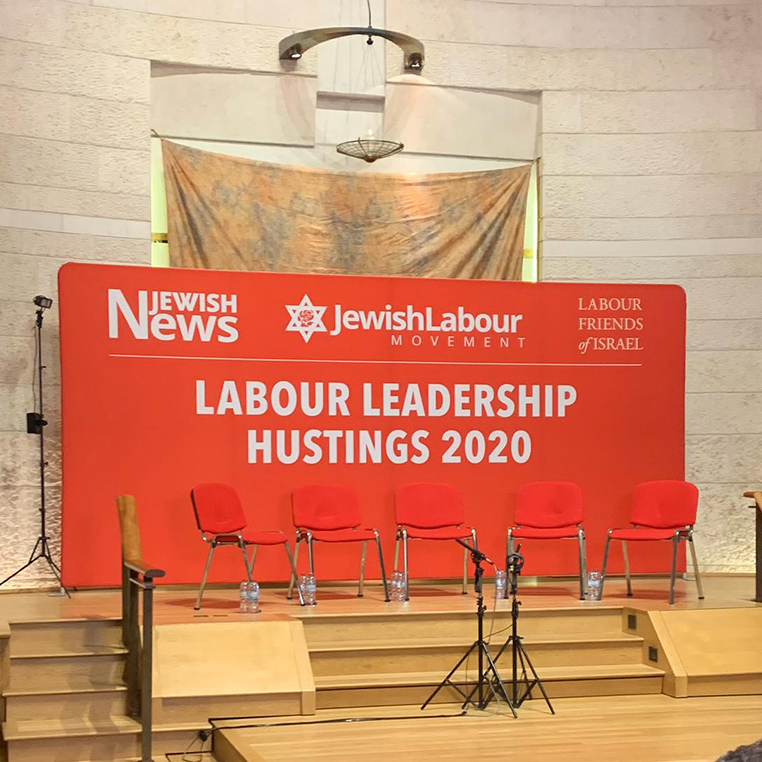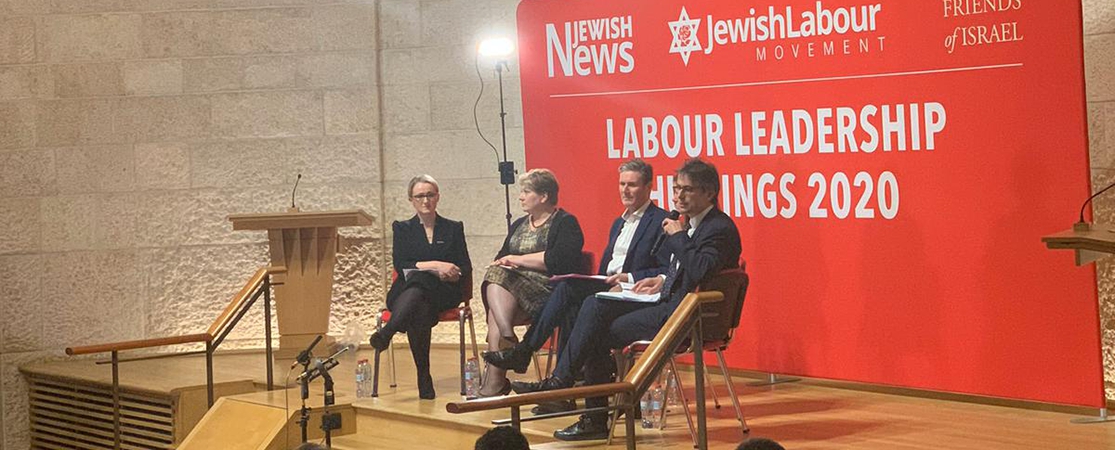The Jewish Labour Movement leadership hustings demonstrated the limits of current attitudes towards antisemitism. The left must develop its own analysis of this oppression.
“Let Jews, like every other minority group, define their own oppression,” wrote Jewish Labour Movement Chair Mike Katz in July 2018, at the height of the controversy over whether Labour should adopt the IHRA definition of antisemitism. The idea that minorities should define their own oppression is a popular idea across some sections of the left, in what others consider a distortion of the Macpherson principle. The ways in which relationships between the Labour Party and sections of the Jewish community have unfolded illustrate the difficulties of this concept.
These difficulties were on prominent display at the Jewish Labour Movement Labour leadership contest hustings, chaired by Robert Peston. In a follow up question to Rebecca Long-Bailey, Peston asked if all the candidates would regard the statement “Israel, its policies, and the circumstances surrounding its creation are racist” as antisemitic. All answered yes.
I don’t think Rebecca Long-Bailey really believes that calling Israel’s policies racist is an act of antisemitism. I highly doubt any of the candidates believe that. The Labour Party’s 2019 Race and Faith Manifesto acknowledged the structural racism of the British economy against Black and Asian people. It would be absurd to suggest this same structural analysis could not be applied to the State of Israel, particularly given laws such as the 2018 Nation State Bill which promote the rights of Jews over non-Jews within the state. Even Israeli President Reuven Rivlin criticised the bill for permitting discrimination on racial and religious grounds.
In this case, why did Long-Bailey and the other candidates answer yes to Peston’s question? Primarily, they were seeking to avoid one of the chief criticisms levelled against the previous Labour leadership: that as non-Jews, they refused to allow Jews to define their own oppression.
When the Jewish Labour Movement says that Jews must define their own oppression, it is clear that they have limits in mind in terms of who they mean by Jews . Robert Peston is afforded the power to demand candidates accept his definition of antisemitism because he has been declared kosher by the Jewish Labour Movement, and so he is given a platform and a microphone. Yet when Jeremy Corbyn attended a Seder hosted by radical Jewish group Jewdas, other Jewish groups, including the Jewish Labour Movement, lost little time in declaring that these were not the Jews they had in mind.
The Jewish Labour Movement claims unparalleled legitimacy to represent Jewish people in the Labour party. There are compelling arguments for this claim. The Jewish Labour Movement is the only official Jewish affiliate to the Labour Party, one of its oldest affiliates and boasts 3,000 members. To become a member, however, requires signing up to their aims, including the promotion of Zionism and the centrality of Israel to British Jewish life. As a committed diasporist and anti-Zionist Jew, the Jewish Labour Movement is neither a group I can join nor a group which can claim to represent me. They also have not released data showing how many of their 3,000 members are actually Jewish. The Jewish Labour Movement deserves to be taken seriously as a major Jewish force within the Labour party, but not a hegemonic one.
The Jewish Labour Movement’s call to be the singularly recognised Jewish voice on Labour Party issues is in part a reaction to a tokenism which is widespread in some left-wing circles, where people will refuse to hear any critique that their actions may be antisemitic because some Jews agree with them. The Jewish community is famous for its internal schisms; it’s therefore not difficult to find a Jew who will agree with any opinion you espouse, up to and including Holocaust denial. Having fringe or even antisemitic opinions does not, however, disqualify Jews from being Jewish. The litmus test of whether something is antisemitic cannot be whether a singular Jew thinks it is.
The Jewish Labour Movement would argue that if a minority of fringe Jews think something is not antisemitic and the majority of Jews disagree, we should rule with the majority. The decision about who is allowed to claim to speak on behalf of this majority is fraught to say the least. Yet even if every Jew could somehow be polled on what constitutes Jew-hatred, to do so would diminish the severity of antisemitism. The catastrophic impact of antisemitism means it is an ideology that merits serious discussion and analysis, without being reduced down to a popular vote.
Another deeply uncomfortable truth is that Jewish groups alone cannot decide what constitutes antisemitism, because it is not just Jews who are affected by how it is defined. Discussions on antisemitism have become so entangled with questions around Zionism and criticism of Israel, as demonstrated in the Jewish Labour Movement hustings, that we cannot talk about defining antisemitism without considering the impact of this on the cause of Palestinian human rights. Certainly, the fight for Palestinian rights can only be strengthened by fighting antisemitism. Yet there have been numerous examples of events at British universities being shut down on the grounds of antisemitism purely for promoting the peaceful BDS movement. Several US states have outlawed any boycott of Israel, citing antisemitism. The way antisemitism is defined has real impacts for the Palestinian people.
Edward Said’s 1979 article Zionism from the Standpoint of its Victims was prescient in its discussion of how Palestinians are erased from the conversation about the meaning of Zionism. Under the definition of antisemitism to which Rebecca Long-Bailey and the other candidates agreed, a Palestinian could be labelled antisemitic for stating the basic facts of their life: that they lost their home, their family members and their freedom of movement simply because they were a non-Jewish person living in the land of Israel. This cannot be a basis for anti-racist politics.
“This is a moral issue,” bellowed Peston during the hustings. The definition of antisemitism is moral, but it is also political. The way antisemitism is defined is ideological, and results in material consequences for Jews, Palestinians, and wider society. To pretend otherwise only obscures how power operates in these discussions.
 Pictured: everybody at the hustings who understood what antisemitism is.
Pictured: everybody at the hustings who understood what antisemitism is.Antisemitism is too complex to be reduced to a static list of examples. If Labour wishes to become a Party truly robust enough to tackle the structural issue of antisemitism, every member will need to take part in a process which requires unlearning and painful conversations. Jewish voices undoubtedly should take centre stage in these discussions, as we are experts in antisemitism through experience. There has also been real harm to Jewish members which needs to be addressed and reckoned with.
The personal experiences of Jewish members can be a grounding force for defining antisemitism, but they cannot be the definition of antisemitism. The left must formulate its own analysis of antisemitism from a left-wing perspective if it wishes to tackle it effectively, taking into account its history and contemporary manifestations. This leaflet produced by the Labour Party could be a fantastic starting point for this more thorough analysis, as could the writings of Moishe Postone and the American group Jews for Racial and Economic Justice. Of course, antisemitism is not the only oppression which needs to be analysed by the left; Labour Party members still have a lot of learning and unlearning to do around anti-Black racism, transphobia, sexism, ableism, colonialism and a raft of other issues. The interconnected struggles against all types of oppression should be central to our movement.
After years of seeing antisemitism used as a political football, it feels odd to be calling for further politicisation of antisemitism. Yet the politicisation of antisemitism could be a positive thing. It would be an opportunity to fully integrate fighting hatred against Jews with the Labour Party’s mission to eradicate all forms of injustice, truly embedding the fight against antisemitism as a Labour value.
